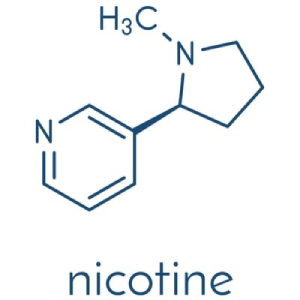Is Nicotine Preventing Coronavirus Infections?
27th May 2020

For many of us, COVID-19 and the resulting lockdown has changed the way we live, and the way we think about our health in general. Wearing masks when out in public is becoming a common sight and social distancing remains absolutely vital to stop the spread of the virus. The international medical community has been working tirelessly to find out how the virus works and what can be done to combat it, reduce symptoms, create vaccines and hopefully eradicate Coronavirus for good. There is a huge amount of information, and misinformation, around treatments, progress and strategies to help flatten the curve available to us today, which is why it is so important to remain as informed as possible, while also making sure certain claims are taken with a pinch of salt.
One of the most widely circulated and debated pieces of information recently has been the use of nicotine to help stop the spread of the Coronavirus. The important thing to state here is that no medical professionals are advising the public to start smoking, and the advice for smokers remains the same as ever - for health reasons, you should try to quit smoking, using nicotine replacement therapies if needed. While incidences of smokers with Coronavirus have been lower than originally expected, which is why this theory is being examined, smokers who do catch the virus are more likely to experience severe symptoms and are more likely to die than non-smokers, due to weaknesses in the respiratory system.
We’ll be collating the information available on the research between nicotine and the coronavirus outbreak, by date, from a variety of medical journals and reputable sources.
 04 April 2020: Smoking, vaping and hospitalization for COVID-19.
04 April 2020: Smoking, vaping and hospitalization for COVID-19.
Konstantinos Farsalinos has been one of the key researchers around the health impacts of vaping for many years now, and is highly respected in this field. In this early piece of research, it was found that among Chinese patients, despite a high rate of smoking across the country, a surprisingly small number admitted to hospital for COVID-19 were smokers. However, it did maintain that quitting smoking as a general health measure is valid and important advice, and that the results of the study “warrant an urgent investigation of the clinical effects of pharmaceutical nicotine on COVID-19 susceptibility, progression and severity.”
April 21 2020: Low incidence of daily active tobacco smoking in patients with symptomatic COVID-19.
This French study examined both inpatients and outpatients being treated for COVID-19, and found 4.4% of inpatients and 5.3% of outpatients were smokers. Compared to the general French population, where 25.4% reportedly smoked daily in 2018, this was a surprisingly small number. However, they did note that health-care workers and those with existing chronic conditions were disproportionately represented in the sample, who are both far less likely to smoke than the average person. They also noted that “social desirability bias” may have played a part in these number. This refers to the idea that COVID-19 patients may be more likely to deny smoking when asked, as they want to be seen to be following medical advice properly. This study was also not peer-reviewed, like many similar studies.

April 2020: COVID-19, a disease of the nicotinic cholinergic system? Nicotine may be protective.
In this second piece of research from Konstantinos Farsalinos, a team of Greek and American researchers continued to advocate for research into the use of nicotine in treating COVID-19, as they are involved in some of the same pathways and systems in the body. They also explained that severe coronavirus cases are caused when the body has a hyper-inflammatory response, known as a cytokine storm.
30 April 2020: Editorial: Nicotine and SARS-CoV-2: COVID-19 may be a disease of the nicotinic cholinergic system .
This piece of research makes the hypothesis that COVID-19 may be a disease of the nicotinic cholinergic system. This means that the systems in the body that react to nicotine are the same ones affected by COVID-19, and that nicotine may be essentially acting as an anti-inflammatory, potentially preventing COVID-19 infections from becoming too serious. However, like all of the previous research, it’s important to note that the main outcome of the study was the strong recommendation for further research in the area, and that nicotine should not be used by doctors or the general public until more is understood about this phenomenon.
01 May 2020: COVID-19 and Smoking. Is Nicotine the Hidden Link?
This article appeared in the European Respiratory Journal and contained research from Italian scholars on the relationship between nicotine and COVID-19. Previous research in this journal had indicated the severe consequences smoking can have on COVID-19 patients, highlighting the importance of quitting smoking as soon as possible. This research concurred with the previous paper, however, also noted that nicotine could be used as an ACE-antagonist to help reduce the severity of symptoms or protect from the virus. It expressed the potential of nicotine as an avenue of research, though emphasised that further research was required.

11 May 2020: WHO statement: Tobacco use and COVID-19
The World Health Organisation (WHO) released a statement on tobacco use and COVID-19, stating that smokers should make efforts to quit, as smokers are more likely to be very seriously affected by the virus, and that research is currently insufficient on the relationship between nicotine and the virus:
“WHO is constantly evaluating new research, including research that examines the link between tobacco use, nicotine use, and COVID-19. WHO urges researchers, scientists and the media to be cautious about amplifying unproven claims that tobacco or nicotine could reduce the risk of COVID-19. There is currently insufficient information to confirm any link between tobacco or nicotine in the prevention or treatment of COVID-19.”
This is just a small portion of the research currently available on the relationships between smoking, vaping, nicotine and COVID-19. While new developments are being made every day, the most important thing to take away from all this research right now is that smokers should be trying to quit as soon as possible to reduce their risk of developing severe coronavirus symptoms and to protect their general health overall.
